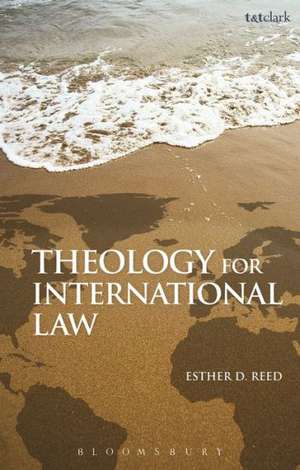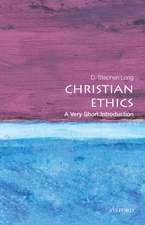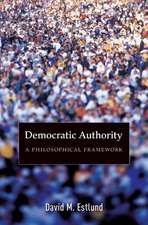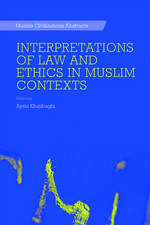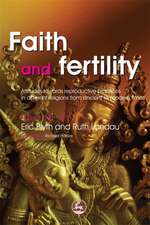Theology for International Law
Autor Dr. Esther D. Reeden Limba Engleză Paperback – 28 aug 2013
Preț: 181.32 lei
Preț vechi: 209.16 lei
-13% Nou
Puncte Express: 272
Preț estimativ în valută:
34.70€ • 36.32$ • 28.88£
34.70€ • 36.32$ • 28.88£
Carte tipărită la comandă
Livrare economică 01-15 aprilie
Preluare comenzi: 021 569.72.76
Specificații
ISBN-13: 9780567262066
ISBN-10: 0567262065
Pagini: 368
Dimensiuni: 138 x 216 x 30 mm
Greutate: 0.48 kg
Ediția:New ed.
Editura: Bloomsbury Publishing
Colecția T&T Clark
Locul publicării:London, United Kingdom
ISBN-10: 0567262065
Pagini: 368
Dimensiuni: 138 x 216 x 30 mm
Greutate: 0.48 kg
Ediția:New ed.
Editura: Bloomsbury Publishing
Colecția T&T Clark
Locul publicării:London, United Kingdom
Caracteristici
Discusses
the
resources
available
to
Christian
people
for
thinking
through
ethics
and
politics
Notă biografică
Esther
D.
Reedis
Associate
Professor
of
Theological
Ethics
and
Director
of
the
Network
for
Religion
in
Public
Life
at
the
University
of
Exeter,
UK.
Cuprins
AcknowledgementsAbbreviations1
Introduction2
Towards
a
Restatement
of
Natural3Jus
CogensNorms
and
the
Impurity
of
Natural
Law
Reasoning4
Peacemaking
through
Law:
Ambivalence,Violence
and
Answerability5
Responsibility
to
Protect
and
Militarized
Humanitarian
Intervention:
Tests
and
Challenges6
Nation
States
and
Love
of
Neighbour:
Impartiality
and
theOrdo
Amoris7
Human
Rights
and
Ideological
Confl
ict:
Threats
to
the
Rule
Law8
Concluding
ThesesBibliography
Index
of
Names
Index
of
Subjects
Recenzii
This
is
a
powerfully
argued
book
that
clears
a
lot
of
ideological
ground
and,
one
can
only
hope,
generates
new
interest
in
the
role
of
legal
sources
and
norms
in
moral
theology.
If public theology is a difficult task, it is even more daunting when directly engaging some of the most intractable dilemmas in international affairs such as torture, the 'war on terror,' human rights and humanitarian intervention. Esther D. Reed has taken up this challenge and written a tightly reasoned, theologically sophisticated, and politically savvy volume that respectfully acknowledges the ambiguous but neccessary realities of law, national interest and the use of lethal force without sacrificing central gospel commitments such as care for the poor and love of the 'other'.
Esther Reed's book, unusually lucid in a field where obscurity is often used to stake a claim to authority, should be read by all those who want a powerful, well-informed and essentially optimistic Christian voice discussing such deeply perplexing challenges and developments of human self-ordering in the twenty-first century.
I heartily endorse this elegant, informative, and authoritative Christian theological account of international law.
Esther D. Reed'sTheology for International Lawspans the gap between the fundamental principles that make international law morally compelling and the contemporary issues that make it politically important. In the search for starting points for global ethics, international law is a neglected resource. It matters not only to legal specialists, but to business leaders, activists, and ordinary citizens. Esther D. Reed helps us to understand how law that works between nations begins and why it makes a difference for the future.
Scholars are rediscovering natural law in their search to answer the critics of international law. Esther D. Reed's book is a timely and invaluable contribution to this endeavor. She is the rare scholar who deeply understands both natural law and international law and the promise of both in supporting humanity's striving for peace and the common good.
Reed's book is a welcome addition to the growing literature on religion and international law. Much of this literature is focused on human rights, and Reed distinguishes her book by taking a Christian theological approach to the higher order question of public international law . it lays a solid foundation, and readers not well versed in international law will find the attention to context and background helpful.
If public theology is a difficult task, it is even more daunting when directly engaging some of the most intractable dilemmas in international affairs such as torture, the 'war on terror,' human rights and humanitarian intervention. Esther D. Reed has taken up this challenge and written a tightly reasoned, theologically sophisticated, and politically savvy volume that respectfully acknowledges the ambiguous but neccessary realities of law, national interest and the use of lethal force without sacrificing central gospel commitments such as care for the poor and love of the 'other'.
Esther Reed's book, unusually lucid in a field where obscurity is often used to stake a claim to authority, should be read by all those who want a powerful, well-informed and essentially optimistic Christian voice discussing such deeply perplexing challenges and developments of human self-ordering in the twenty-first century.
I heartily endorse this elegant, informative, and authoritative Christian theological account of international law.
Esther D. Reed'sTheology for International Lawspans the gap between the fundamental principles that make international law morally compelling and the contemporary issues that make it politically important. In the search for starting points for global ethics, international law is a neglected resource. It matters not only to legal specialists, but to business leaders, activists, and ordinary citizens. Esther D. Reed helps us to understand how law that works between nations begins and why it makes a difference for the future.
Scholars are rediscovering natural law in their search to answer the critics of international law. Esther D. Reed's book is a timely and invaluable contribution to this endeavor. She is the rare scholar who deeply understands both natural law and international law and the promise of both in supporting humanity's striving for peace and the common good.
Reed's book is a welcome addition to the growing literature on religion and international law. Much of this literature is focused on human rights, and Reed distinguishes her book by taking a Christian theological approach to the higher order question of public international law . it lays a solid foundation, and readers not well versed in international law will find the attention to context and background helpful.
